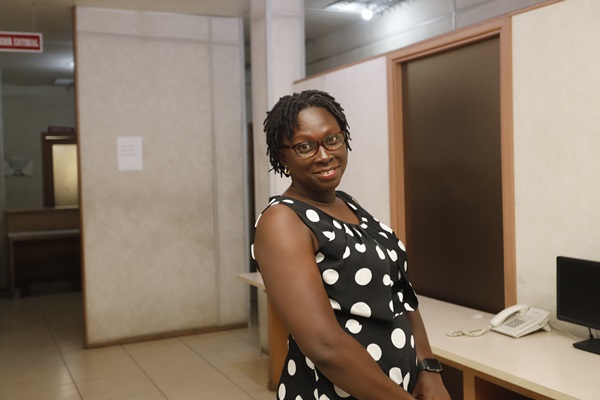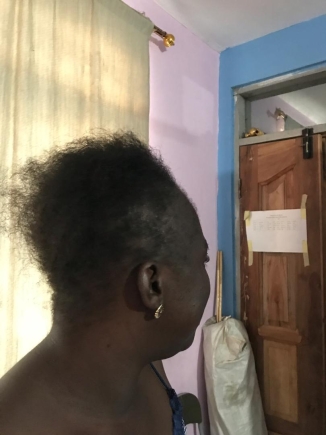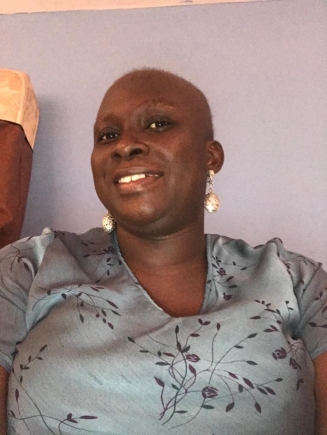
I chose to live •Diary of a breast cancer
It’s been five years. It was like a dream. But it was real. Initially, I thought it was an after-shave bump. But I realised it was changing position. I asked my husband to check it for me. He said it was normal.
It was painless. It was not big, slightly bigger than my thumb. It didn’t seem to be moving but I realised it was no more in my armpit but was in my upper breast.
Strangely, I went to the clinic to report on two different occasions but I reported something different. Maybe, it was because it was painless. This went on for about two months.
One Sunday night, I was picking my children up from my parent's house after work when I felt a sharp pain; it was once and I never felt it again even to the point of treatment. I could have ignored it but my scream alerted my mother, who usually listens to a local radio station that discusses breast cancer.
She said every time she listened to the radio about breast cancer, she would think about me. To her, the predisposing conditions were similar to my experiences. She said I had very early menstruation and gave birth very late. Well, I had not thought about this. And by the nature of my lifestyle, I would hardly get time to listen to such programmes on radio. She insisted I go to the hospital the next day. The next day was my day off from work so she was afraid that I would have plenty to do and would decide to postpone the following day, which was a delay she could not accept.
As early as 5 a.m., she had called. I told her I was already preparing. When I met the company doctor, she examined me and said I needed further screening. She quickly wrote an ultrasound scan for me, which came out as suspicious.
That very day, she referred me to the general surgeon at the Korle Bu Teaching Hospital’s Surgical Block.
The processes at Korle Bu were faster than I expected. I repeated the ultrasound, did a biopsy and had a serious discussion with a team of doctors. They decided to do a lumpectomy because the lump was quite small and there was less spread. They told me why they would not start with chemotherapy and I accepted it.
The processes started and I had to see an anaesthetist. When I met the affable doctor there, he asked me if I had children. And I answered in the affirmative. During our conversation, he advised that my daughter, who was only five-years-old then, should marry early, give birth early and probably remove the breast to avoid getting breast cancer. Then I asked him why I was being prepared for a lumpectomy if my daughter who did not have breast cancer, should remove her breasts to prevent her getting it.
He laughed and said if I wanted to do a mastectomy, I should go back and discuss it with the doctors.
When I left his office, I immediately called my husband. We had done extensive research together about the disease, aside from my readings. He said I should choose what was best for me and he would support me 100 per cent.
When I went back to the surgical block, sadly, one doctor said I could even remove both breasts but the cancer could still come to any part of my body. I was hurt but strangely, it did not change my resolve. A doctor who heard our conversation picked up my folder and asked me to follow him. We had a serious discussion which convinced him that I was determined to do the mastectomy. He gave me a form to fill out and sign, stating that I chose the drastic treatment myself.
Yes, I chose to live. Why did I choose this treatment? During the diagnosis period, the head of the centre that I used for my scans and mammograms was an experienced radiologist who had extensive discussions with me. He advised me to consider my children and make the best decisions for my treatment. That’s when I started researching. So before the anaesthetist talked about mastectomy with me, I knew it was the best choice. I did not want a reoccurrence.
I was booked for the surgery and I had it on October 31, 2019. After the surgery, the sample was sent for further pathological analysis and it came out that though the lump was small and the cancer cells had not spread much, it was an advanced form of cancer. Precisely, an aggressive cancer. This justifies my decision to remove the total breast.
To me, the process that led to my decision was a miracle. Yes, those who know my faith would be surprised to hear me speak about miracles. But that is how we believe God works miracles. The wisdom from above.

I have introduced faith so I would like to talk about religion and treatment of cancer. After my second ultrasound and mammogram, when I was told the lump was malignant, I was with my 71-year-old father, who was more worried than I was. He was surprised that I seemed unperturbed.
The God factor
But was I unperturbed? No. Immediately it was confirmed that it was cancer, I prayed to God and asked that His will should take place in my life. After the prayer, it was as if a burden had been lifted from my shoulders, right from the diagnostic centre. This was because I threw that burden to my God. ( 1 Peter 5:7). Yes. I trusted in God to give a clear direction. Did it mean I should not seek medical treatment? No. God uses his creations to work his purpose and throughout my treatment, the God-factor was clear.
On several occasions during chemotherapy, doctors and hospital staff asked me who the patient I brought was, and I would say I was. With God, I defied all symptoms of cancer treatment, even though my hair came off. I stayed positive, a very vital ingredient in surviving cancer.
With my believe in God, I went through every treatment the doctors prescribed, knowing that He was using humans to help me.

Recently, when I had to mention my experience as a testimony of the power of prayer, one of my religious leaders, who visited me just after surgery five years ago, said he had actually forgotten about the whole experience because I had been so positive and had more than a normal life.
Yes, I chose to live. To live for my family who supported me, to live for my friends who prayed with me and to ultimately live for my God who sustained me on my sick bed.
The family factor
Every cancer patient needs the total support of their family. Complete love and care are very important to someone going through cancer treatment. Why? Because it is very difficult to understand why you got the disease. I asked myself so many questions. What did I do wrong? Could I have prevented it? What would the future hold for me?
This was a very difficult period for me, even with God and family and positive thoughts. How much more someone without these? So please give your best to your family members who are going through cancer treatment, from diagnosis to treatment and even after treatment.
Yes, after treatment I would sometimes go through depression but with the support of family and staying busy with God’s work, I have survived five years.
The money factor
Many people avoid cancer treatment and go to prayer camps and other alternative treatments because of the lack of money. Sadly, at the end of the day, they come to the hospital too late to survive. Health insurance indeed covers part of the cost of cancer treatment but it is still expensive.
During my diagnosis, in the consulting room, the consultant doctor asked a middle-aged woman if she had money to do a biopsy at that time, which cost GHC500 and it was clear that she did not have the money.
On average, one would spend about GHS20,000 to GHS40,000 on cancer treatment. How many people can afford that?
This is more burdensome than the disease. This calls for policies and support from other people.
Many have lost spouses because of the financial burden. Sometimes, such patients give up on themselves and stop treatment.
Many cancer cases are through no cause of the patients so there should be policies and support for cancer treatment to reduce the mortality rate.
Conclusion
If you have cancer, seek treatment, stay positive and trust in the Almighty to give guidance and you will live.
Yes, I chose to live. Will you?
